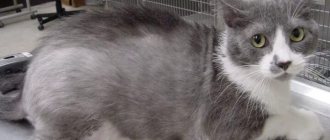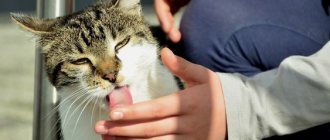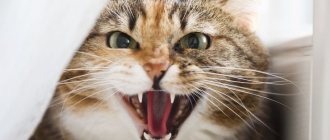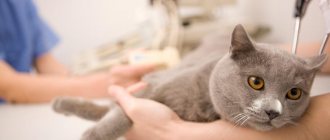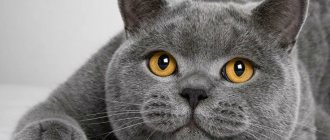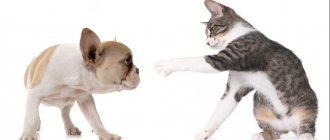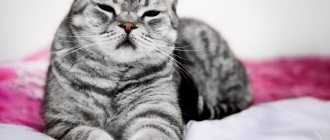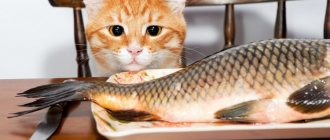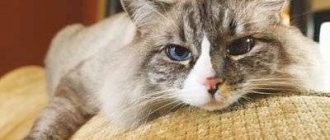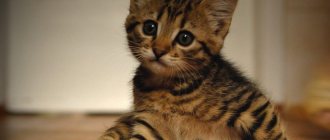Why do cats stop licking their fur?
Refusal to lick always indicates the presence of certain problems with the health or mental state of the cat. The animal looks unkempt and unkempt. Let's look at why pets may stop washing themselves.
Diseases of the gums and mouth
Gingivitis or the initial stage of periodontal disease often lead to the cat refusing to lick. Inflamed, ulcerated gums in the area of the teeth cause severe pain when washing, which leads to a gradual abandonment of this habit.
For your information. Diseases of the gums and mouth are usually accompanied by a putrid odor from the mouth.
Arthritis
Any movement of the paws with arthritis causes joint pain. The animal tries to avoid painful sensations and, accordingly, tries to lick its fur coat as little as possible.
Obesity
Obesity is the scourge of castrated and sterilized animals. Improper nutrition leads to a sharp increase in body weight, and increased body weight makes domestic cats lazy and sluggish. Victims of excess weight wash themselves much less often than their lean counterparts.
Be sure to read:
Why cats love olives: is it possible to give a canned product, benefits and harms
Stress
Stress can also affect the frequency and quality of washing. Animals in stressful situations refuse to drink and eat, do not go to the toilet and stop licking themselves.
Infectious diseases
Serious health problems are usually accompanied by refusal to eat and drink, lethargy and apathy. Sick cats stop washing themselves and their fur becomes dirty and greasy.
Why do cats wash themselves?
3453Pavel
The cat has long been primarily a domestic animal, but the power of instincts, passed on from generation to generation, has not yet been exterminated. And the cleanliness with which they care for their fur confirms this. Let's find out why cats wash themselves and what lies behind this ordinary, daily ritual?
The key to a successful hunt
Predatory wild felines are forced to hunt to feed themselves and their offspring. And here it is important that the smell emanating from the fur cannot be smelled by the victim. A domesticated cat, which is allowed to go outside, obeying the instinct of the hunter, can catch a bird or a mouse. What is important here is not only patience and waiting for the victim, but also the absence of a smell that could give away the cat. Therefore, these cunning predators lick the fur - they wash themselves to get rid of it.
© shutterstock
Wild individuals also retained the need to distribute secretions from the sebaceous glands evenly throughout the fur. Thereby creating an obstacle to moisture that may enter during hunting. It will prevent the wool from getting too wet.
Why does a cat need to wash itself?
In addition to hunting, licking a cat is necessary for the following purposes::
- Health and well-being . It has been noted that cats also wash themselves to make their fur look neat. The hard and rough tongue serves as an excellent brush, helping to get rid of tangled dirt and dead hair that can roll into unpleasant lumps. Cats wash themselves with their tongue, but their teeth can also be involved in the process. It is convenient to use the paws to complete hygiene procedures by cleaning the ears and face.
- Maintaining a comfortable body temperature . By washing the cat, it not only moisturizes the fur, but also fluffs it up. The air that forms between the hairs creates an optimal balance of body temperature. This microclimate is comfortable in hot and cool weather.
- Socialization . A cat can rub against a relative that it clearly sympathizes with. This is how not only acquaintance occurs, but also the transfer of smells, which can then become a signal that this is a friend.
- Conflicts often arise among cats . An obviously strong male will never lick himself during a fight. Only losers wash themselves. This is a sign that the opponent is giving up.
- Caring for kittens . Newborn babies do not yet wash themselves, so their mother cat does it for them. Cats wash themselves all the time and teach kittens how to care for themselves. This is not only teaching them hygiene, but also a kind of massage for them.
© shutterstock
Anti-stress massage
Please note that cats often wash themselves slowly and thoroughly, enjoying the process itself. If nothing interferes, then the pet can spend quite a lot of time licking itself.
The hard, rough tongue has a massage effect, soothing and relaxing. This way the cat not only cleans its fur, but also relaxes. It is especially important for her to stay in a secluded place where she can calmly wash herself after suffering stress: visiting a veterinary clinic, moving to a new place, communicating with children, etc.
There is also an unpleasant reason for washing cats, when during the process the cat becomes nervous, biting the skin. This may be a symptom of a skin disease, allergic reactions, or annoying parasites. If you notice this, you need to consult a doctor and undergo an examination.
Interesting fact
It has been noticed that cats like to wash themselves less than cats. This is also an instinctive manifestation, since in nature it is the female that is the breadwinner. And the success of the hunt depends on cleanliness and absence of odors.
IMPORTANT!
VETERINARIAN CONSULTATION REQUIRED. INFORMATION FOR INFORMATION ONLY.
Share with friends
Article rating
Reasons why your cat washes itself after being petted (7 photos)
Cat behavior is sometimes a complete mystery. One of them is why do they suddenly start licking themselves after being petted? In fact, there are several logical explanations for this.
Source:
1. Your cat just wants to wash itself.
Source:
The first and simplest reason that cats begin to lick themselves after being petted by a person is a natural cat desire. Cats wash themselves a lot and regularly—they spend between 30% and 50% of their time grooming themselves. Even their bodies are designed for constant grooming - their tongues are covered with thousands of tiny "spines" that are ideal for combing and cleaning their fur.
2. They want to show that they care about you.
Source:
Cats learn to groom themselves from an early age. The mother cat takes care of the kittens and teaches them to care for each other. There is a lot of evidence that cats perceive humans as a big cat - as a parent or brother. So when they start grooming themselves after you pet them, it may be the cat's way of trying to recreate that bond.
3. The cat does not like excessive affection
Source: img.cutenesscdn.com
When you pet a cat, she usually likes it. However, sometimes cats don't like too much affection. According to VCA Hospitals, petting can make some cats feel overstimulated. They may try to bite you, run away, or start licking themselves. If your cat suddenly and nervously begins to do this while you are petting it, it may be time to take a short break.
4. It may signal health problems.
Source: img.cutenesscdn.com
If your cat washes itself too often, not just after you pet it, this may indicate health problems for your pet. One such problem is psychogenic alopecia. According to Cat Health, the main symptom of this condition is hair loss caused by emotional or excessive grooming. If you notice that your cat is licking itself excessively and frequently, it may be time to take it to the vet.
Take care of your furbabies!
Source: img.cutenesscdn.com
If your cat licks itself several times during the day or after you pet it, this is completely normal. The main thing is to track changes in your pet’s behavior in time, and if something happens, contact a veterinarian.
Source: img.cutenesscdn.com
Translated especially for PetPop.
Source: www.cuteness.com
Reasons for cat cleanliness
All owners of mustachioed tabbies often watch how their pets tidy up their fluffy coat. Why do they do this so often and so carefully?
- The most basic reason for such diligent self-care lies in the deeply ingrained habit of getting rid of all foreign odors that might indicate the presence of a predator during the hunt. This is what the wild ancestors of the modern cat tribe did, so genetic memory retains the habit of cleanliness, even if there is no need to get food from an indoor creature.
- Another important reason for increased neatness is the stimulation of special glands that secrete a substance that protects the coat from getting wet.
- By licking its fur, the cat changes the thickness of the air layer between its surface and the skin. This method helps the animal achieve better cooling of the body in hot weather or additional warmth in cold weather.
- Licking yourself or another cat often serves as a demonstration of friendly feelings, sympathy and good humor. This behavior is a unique form of communication between animals and each other, a manifestation of their social connections.
- Scientists have identified another purpose of cat hygiene – stress relief. Methodical, repetitive movements allow a cat to relax and calm down when she is experiencing separation from her beloved owner, a serious illness, or other situations that cause internal tension.
Reasons for washing your cat frequently
A pet may lick its fur for a number of reasons.
Normal hygiene
Cats lick themselves to stay healthy and feel good. This allows you to get rid of fallen hairs, dirt, and small debris. Washing is performed after eating, sleeping, visiting the litter box, contact with humans and other animals. Often, in this way, pets gnaw out small parasites that humans do not notice.
When heavily infested with parasites, cats wash themselves more actively and lick themselves more often. They become irritable and may bite and scratch themselves until they bleed.
Combing the fur
The matted fur straightens out under the influence of roughness on the tongue. Hairs licked during the procedure enter the gastrointestinal tract, which can lead to complications in the digestive system.
Preparing for the hunt
After contact with other animals or people, cats smell someone else's scent. To get rid of it, the pet licks itself. At the same time, special fluids get onto the fur with saliva. Cats groom themselves more thoroughly than males, since they are the main breadwinners in prides and are more effective as hunters.
Maintaining optimal body temperature
In extreme heat or cold, cats lick themselves more actively. In summer, the animal uses its tongue to fluff up the hairs, moisturize them, which helps cool the skin. In winter, cats lick their fur more tightly so that the fur provides better protection from adverse weather conditions.
Moisture protection
By licking, cats distribute the secretion of the sebaceous glands evenly throughout the body. This creates a water-repellent layer. Some breeds have this ability so developed that they can swim, fish and not get wet.
Method of communication
Cats can also clean other members of their species with their tongues. By licking their fellow cats, cats help them get to hard-to-reach areas. Such a manifestation of care simultaneously indicates the presence of attachment to another animal. During the rut, cats lick their cats, marking them in this way. Females lick newborn kittens both for hygienic purposes and as an expression of love.
Stress
During times of stress, cats need to relax tense muscles. Since during licking they exert considerable pressure on the body with their tongue, this helps to relax. Frightened, irritated animals often achieve calmness in this way. Sometimes, however, such a habit becomes obsessive and neurotic. A cat can lick its fur for a long time until bald patches form.
